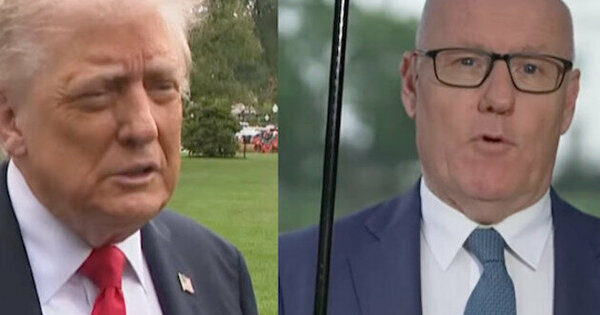By Anupama Ghosh
Copyright thehindubusinessline

Markets closed sharply lower on Monday, with IT stocks bearing the brunt of selling pressure after the US administration under President Donald Trump imposed a steep $100,000 one-time fee on new H-1B visa applications. The benchmark BSE Sensex tumbled 466.26 points or 0.56 per cent to settle at 82,159.97, while the Nifty 50 dropped 124.70 points or 0.49 per cent to close at 25,202.35.
The Nifty IT index plunged 2.95 per cent, marking the steepest sectoral decline of the day. Major IT services companies took a beating as investors feared the impact on their business model that heavily relies on skilled visa workers. Tech Mahindra led the losers, plummeting 3 per cent to ₹1,507.20, followed by Tata Consultancy Services which fell 2.96 per cent to ₹3,075.50. Infosys declined 2.55 per cent to ₹1,500.90, while Wipro dropped 2.11 per cent to ₹250.49.
“The primary reason for the negative closing was heavy selling in IT stocks, triggered by the US administration’s decision to impose a steep $100,000 one-time fee on new H-1B visas under President Donald Trump’s policy,” said Vaibhav Vidwani, Research Analyst at Bonanza Group. “This move rattled investor sentiment in the IT sector, which relies on such visas for skilled talent, potentially squeezing margins for major players.”
The broader market witnessed widespread selling with 2,612 stocks declining against 1,688 advances on the BSE. The Nifty Midcap 100 fell 0.67 per cent to 58,699.50, while broader indices also faced pressure. Market volatility spiked with India VIX jumping 5.92 per cent to close at 10.55, indicating heightened investor caution.
Pharma stocks also came under pressure, with the sector declining 1.41 per cent. Cipla fell 2.14 per cent to ₹1,542.00, snapping a two-session winning streak in the pharmaceutical space.
However, some sectors provided cushion to the overall decline. Adani Enterprises emerged as the top gainer, surging 3.98 per cent to ₹2,624.50, continuing its rally after recent regulatory clarity. Eternal Industries gained 1.60 per cent to ₹341.95, while Bajaj Finance rose 1.37 per cent to ₹1,006.00. Adani Ports advanced 1.20 per cent to ₹1,445.00 and UltraTech Cement climbed 1.10 per cent to ₹12,645.00.
“Adani Group stocks outperformed yet again, with continued buying interest after SEBI’s clean chit,” noted Hariprasad K, SEBI-registered Research Analyst and Founder of Livelong Wealth. The energy sector gained 0.69 per cent, while metals and media indices posted modest gains of over 0.4 per cent each.
The session witnessed high volatility with the Nifty oscillating between an intraday high of 25,331.70 and a low of 25,151.05. “Despite the weak opening, the market quickly filled the gap and attempted a recovery. However, selling pressure resurfaced, dragging the Nifty to its intraday low as profit-booking dominated the latter half of the session,” observed analysts at Ashika Institutional Equities.
Banking stocks showed mixed performance with the Nifty Bank index declining 0.31 per cent to 55,284.75. The sector faced headwinds from broader market weakness, though some individual stocks like Canara Bank and Axis Bank managed gains.
The rupee weakened against the dollar, adding to market concerns. “Adding to the caution, a weaker rupee and stronger US dollar further dampened sentiment,” said Ponmudi R, CEO of Enrich Money.
Commodity markets showed mixed trends with metals providing some support to the overall market sentiment. The energy sector’s outperformance was attributed to selective buying in oil and gas stocks amid global energy dynamics.
Technical analysts highlighted key support and resistance levels for the markets. “The 25,000 level remains a crucial psychological support, and as long as the Nifty sustains above it, a buy-on-dips strategy remains appropriate,” said Nilesh Jain, Head of Technical and Derivatives Research at Centrum Broking.
“We are of the view that, as long as market is trading above 25,300/82,500, the weak sentiment is likely to continue. On the downside, it could slip till 25,100-25,050/82,000-81,700,” added Shrikant Chouhan, Head Equity Research at Kotak Securities.
The market’s decline came despite positive domestic developments including the implementation of GST rationalisation with the merger of four tax slabs into two – 5 per cent and 18 per cent – along with a new 40 per cent slab for “sin goods.” “Expecting the move to boost consumption, benefiting sectors from auto to FMCG,” analysts noted.
Foreign institutional investor flows remained cautious, though domestic investors continued their steady support. “Steady inflows from domestic investors and positive growth signals continue to provide a supportive backdrop, though foreign flows remain cautious,” observed market participants.
Looking ahead, market participants will closely monitor developments around Commerce Minister Piyush Goyal’s visit to the US for trade deal negotiations – the first since the Trump administration imposed higher tariffs. “After the recent run-up, equities are likely to consolidate, tracking developments on this front,” said Siddhartha Khemka, Head of Research at Motilal Oswal Financial Services. The focus will remain on any potential policy clarifications regarding the H-1B visa fee structure and its long-term impact on India’s IT outsourcing industry.
Published on September 22, 2025



